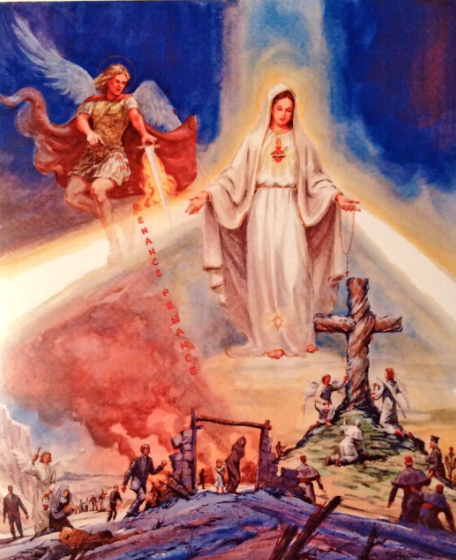Joseph Cardinal Ratzinger had denied that John Paul II said these things during the press conference on the third secret on June 26, 2000.
According to one source, when asked about the third secret, Lcia said it was “in the Gospels and in the Apocalypse,” and at one point had even specified Apocalypse chapters 8 to 13, a range that includes the Book of Revelation 12:4, the chapter and verse cited by Pope John Paul II in his homily in Fátima on May 13, 2000.
Along with the secret’s text, Cardinal Joseph Ratzinger had published a theological commentary in which he stated: “A careful reading of the text of the so-called third’secret’ of Fatima… will probably prove disappointing or surprising after all the speculation it has stirred.” There is no great mystery revealed, nor is the future revealed.” After explaining the distinction between public and private revelations, he warned readers not to interpret the message as a predetermined future event:
“The purpose of the vision is not to show a film of an irrevocably fixed future. Its meaning is exactly the opposite: it is meant to mobilize the forces of change in the right direction. Therefore we must totally discount fatalistic explanations of the “secret”, such as, for example, the claim that the would-be assassin of 13 May 1981 was merely an instrument of the divine plan guided by Providence and could not therefore have acted freely, or other similar ideas in circulation. Rather, the vision speaks of dangers and how we might be saved from them.”
He then moved on to talk about the symbolic nature of the images, noting: “The concluding part of the ‘secret’ uses images which Lucia may have seen in devotional books and which draw their inspiration from long-standing intuitions of faith.” As for the meaning of the message: “What remains was already evident when we began our reflections on the text of the ‘secret’: the exhortation to prayer as the path of ‘salvation for souls’ and, likewise, the summons to penance and conversion.”
But then, during a homily in Fatima on 13th May 2010, as then Pope Benedict, he had said that “”we would be mistaken to think that Fatima’s prophetic mission is complete.” He then expressed the hope that the centenary of the 1917 apparitions may “hasten the fulfillment of the prophecy of the triumph of the Immaculate Heart of Mary, for the glory of the Blessed Trinity.”
Ingo Dollinger, a former German priest and theology professor, was quoted as saying that his long-time friend Cardinal Ratzinger had confided that what the Vatican had published about the third secret was incomplete.
According to Dollinger, Ratzinger told him that the published portion of the third secret was true, but the unpublished portion alluded to ‘a bad council and a bad Mass that was to come in the near future.’
Dollinger had previously said similar things about Ratzinger. He was quoted as saying nine years ago that his conversation with Ratzinger was ‘burning in his mind.’
As pope emeritus in the shadow of Pope Francis, Benedict has largely remained silent on all matters, but he clearly felt compelled to speak out about the latest Dollinger allegation.
‘Several articles have recently appeared, including declarations attributed to Professor Ingo Dollinger according to which Cardinal Ratzinger, after the publication of the third secret of Fatima (which took place in June 2000), had confided to him that the publication was not complete,’ said the Holy See’s press office.
‘In this regard, Pope Emeritus Benedict XVI declares that he ‘never spoke with Professor Dollinger about Fátima,’ emphasizing that the remarks attributed to Professor Dollinger on the subject are ‘pure inventions, absolutely untrue,’ and he confirms unequivocally that ‘the publication of the third secret of Fátima is complete.’
The only thing that is certain about this situation is that someone is not telling the truth.

